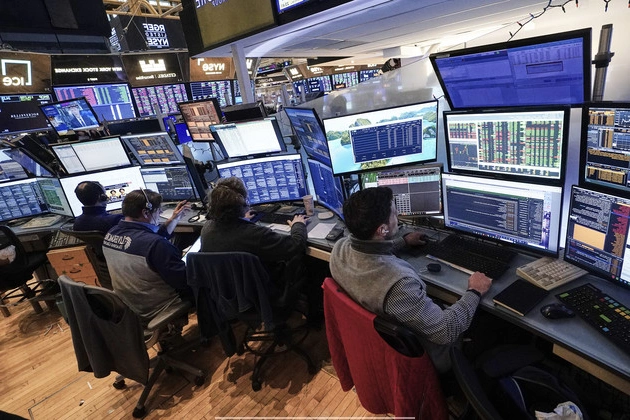
A flurry of recent surveys paint a troubling picture for Donald Trump: growing disapproval of his handling of the economy, increasing concerns about inflation, a majority disapproval of tariffs, and a general pessimistic view on the potential for a recession.
The economy has long been one of Trump’s strongest issues, and he championed his economic agenda on the campaign trail, blasting the Biden administration on inflation and presenting himself as the “Art of the Deal” candidate. But following a tariff onslaught that sent markets into a tailspin and caused worldwide concerns about the future of the global economy, Americans are souring on Trump’s plans.
Warning Signs in Recent Polls
A series of recent polls lay out the warning signs for the White House.
A new Reuters/Ipsos poll released Wednesday showed just 37 percent of respondents approve of Trump’s economic agenda — compared with 42 percent who approved immediately following his inauguration in January.
Confidence in Trump’s handling of the economy also reached a low in Pew Research Center’s survey released Wednesday, where 45 percent said they’re confident in the president’s handling of the economy — the lowest rating in Pew’s surveys of Trump going back to 2019.
That’s a sharp downtick from the 59 percent confidence immediately following the 2024 election last November. With Republicans alone, there’s been a 12-point drop since November.
In another blow for Trump, CNBC’s All-America Economic Survey from earlier this week said the president had his “worst economic approval numbers of his presidential career” — with 55 percent disapproval compared to 43 percent approval, his first net negative CNBC economic numbers while he was president. Their polling showed a deep divide along partisan lines, but noted independents are 23 points more negative than during Trump’s first term.
Impact of Reciprocal Tariffs
The increasingly negative polling spiked after Trump announced sweeping “reciprocal tariffs” on April 2, dubbed “Liberation Day” by the administration. Trump has argued the tariffs would reset economic relationships and fix imbalances with trading partners. As markets shot down and global leaders denounced the move, Trump issued a 90-day pause on the tariffs, leaving a 10 percent baseline in place and opening the door to negotiations.
The White House did not immediately respond to a request for comment on the recent surveys. But Trump has defended his agenda, saying the tariffs will bring in billions of dollars to the U.S. and help build up the country’s manufacturing sector.
“Everyone’s going to be happy,” Trump told reporters on Wednesday. “We’re going to make a lot of money for our people. We’ll be able to lower taxes substantially, and we’re going to be proud of ourselves. We’re not going to be a laughing stock that got taken advantage of by virtually every country in the world.”
But these tariffs are not terribly popular with many Americans. Pew reported 59 percent of people said they disapprove of the tariff hikes, while 39 percent approved. This splits deeply along partisan lines, with 70 percent of Republicans approving and 90 percent of Democrats disapproving. CNBC reported that 49 percent disapproved of across-the-board tariffs, and “majorities believe they are bad for American workers, inflation, and the overall economy.”
Economic Uncertainty and Inflation Concerns
The immediate worldwide market panic over the ramifications of Trump’s tariffs lessened in the aftermath of the 90-day pause, but the economic uncertainty has persisted as Trump has launched (and walked back) attacks on Federal Reserve Chair Jerome Powell and promised dozens of trade deals that may take months to materialize.
Amid the back-and-forths by the administration, surveys show the larger economic picture for many Americans looks increasingly negative. A new Gallup poll from Monday reported that 53 percent of Americans believe their personal financial situation is getting worse, with the pollsters writing that Americans are feeling “unusually pessimistic” about their personal finances.
Inflation predictions have also spiked 11 points since January to 63 percent, according to Gallup. A whopping 60 percent of respondents to CNBC’s polling said they disapprove of his handling of inflation, compared to 37 percent who approve.
In the long term, there’s also fears of a growing recession. Reuters/Ipsos reports 76 percent said they’re concerned a recession is coming, and those concerns are rippling among Republicans too. One in four Republicans said Trump’s approach on the economy is “too erratic,” the poll showed.
Trump’s overall job approval rating has dropped slightly, but he’s got a big swath of the Republican base behind him, multiple polls showed. Over 70 percent of Republicans approve of Trump’s overall job performance, according to Pew.
The Reuters/Ipsos poll surveyed 4,306 U.S. adults nationwide from April 16 to April 21, with a margin of error of plus-or-minus 2 percentage points. Pew’s survey was conducted from April 7-13, interviewing 3,589 adults with a margin of error of plus-or-minus 1.8 percentage points. Gallup polled 1,006 adults from April 1-14, with a margin of error of plus-or-minus 4 percentage points. CNBC’s survey of 1,000 adults was conducted April 9-13 with a margin of error of plus-or-minus 3.1 percentage points.











